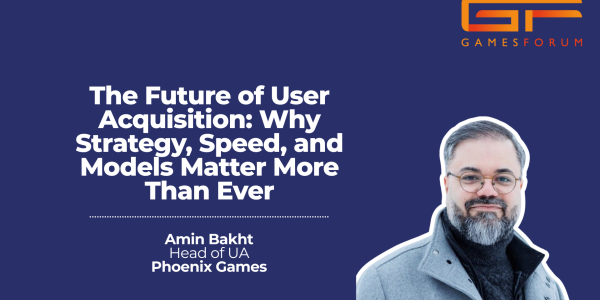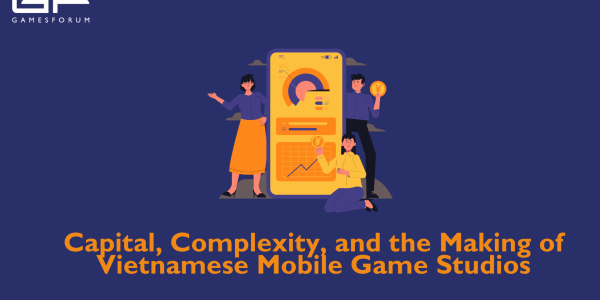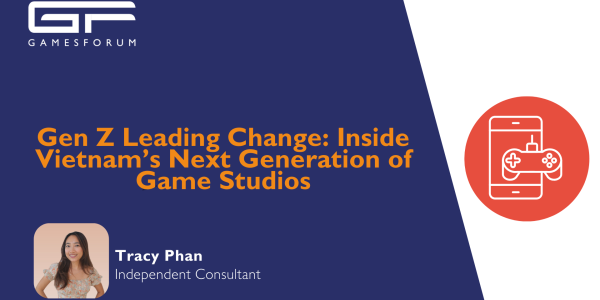Q and A: Edmar Mendizabal From Global Game Servers Discusses How They Help Dice, Psyonix And Ea To Host Their Online Multiplayer Games

Gamesforum London may have drawn to a close, but that doesn’t mean that one of the big problems facing game developers around the world has suddenly gone away.
Supporting an online multiplayer game remains a major challenge for developers of all shapes and sizes. Even though it has become a core part of an enormous number of games over the past few years, it’s really tough for studios to keep lag at bay and to solve other problems – such as stamping out cheaters – on the fly.
That’s where Global Game Servers jumps in. Built through partnerships between leading hosting companies such as i3D.net and MyInternetServices, the Global Game Servers brand and its anti cheat tool FairFight have helped the likes of DICE, Psyonix and EA to keep their online multiplayer services running smoothly.
Edmar Medizabal is a game developer, the Director of Business development for MISi3D and one of the main people driving the Global Game Servers brand to the world. So we caught up with him to find out more about their business and how developers can overcome the biggest challenges in online multiplayer.
Gamesforum: Can You Give Us An Outline Of What Global Game Servers Does And What Services It Offers?
Edmar Mendizabal: Today, most video games utilize online hosting (often referred to as their “backend”), whether it’s for storage of game data or actual game “servers” which are required for hosting multiplayer games. This work can be challenging for new and veteran teams alike, which is where we come in.
Global Game Servers provides performance hosting on a low latency/high bandwidth global network connecting dozens of locations around the globe. We include DDoS mitigation and full management (game build deployments, game patching, game server configuration changes, etc.) so your team can focus on what makes your game special.
We can work as an extension of your team to help every step of the way at no extra cost, beginning with free servers and consultation time to test your game on our network.
Gamesforum: What Are The Main Factors That A Developer Should Be Considering When Setting Up The Servers To Support Their Online Offering?
Medizabal: First, think about support and management. We provide a strong service level agreement (SLA) and include full management of your server environment.
Second, locations! Our latest network map is here. It’s a good practice to soft-launch in smaller territories not only to get valuable feedback on gameplay but also optimize your net-code and deployment process and of course test network performance. Online gameplay is only as good as the network it’s on, so its good to ask any server provider you are considering about theirs. Do they own and manage it? Similarly, do they own the servers or are they re-sellers? If the latter, be sure to ask about resolution times for any network or hardware related support (as they will be the middle-people between the other company(s) and your team).
Another area that often rightfully worries teams working on online games is bandwidth (and DDoS). Make sure you know what bandwidth is included for any server provider you are working with. Although this can often vary by location due to local economics, we include 20TB of bandwidth per month for every server we provide at our USA and European data centers. We also pool this bandwidth for you so if you have 2 servers in The Netherlands, you now have 40TB there and there is no extra charge if one server is using 38TB and the other is using 2TB. We also include a robust level of DDoS mitigation at no extra charge.
Gamesforum: One Of The Big Challenges Facing Many Smaller Studios Growing An Online Offering Is How To Balance Keeping Their Game Online And Lag Free Against The Cost Of Servers. What Are Your Tips For Developers Looking To Strike That Balance?
Mendizibal: A relatively recent high growth area in game hosting has been the utilization of cloud services such as AWS, Google Cloud, Microsoft Azure or our own Red Cloud. The important thing is to leverage the benefit that cloud services offer for bursting additional game instances on demand on top of a base of dedicated servers (also referred to as bare metal), which offers higher performance and lower latency than cloud.
 CCP’S EVE ONLINE WAS HIT BY SERVER LAG PROBLEMS DURING A MAJOR BATTLE EARLIER THIS WEEK, SHOWING HOW HARD KEEPING A GAME ONLINE CAN BE
CCP’S EVE ONLINE WAS HIT BY SERVER LAG PROBLEMS DURING A MAJOR BATTLE EARLIER THIS WEEK, SHOWING HOW HARD KEEPING A GAME ONLINE CAN BEMany studios become customers once they realize their cloud service provider is actually extremely expensive when utilized for 24/7 use (for both bandwidth and compute time). We’ve recently developed a platform with an API coming shortly that allows studios to utilize our dedicated servers for their base needs and automatically burst into their own cloud account (incl. AWS, Google, Azure, Red) for instant savings and game performance improvements.
They can manage everything within our platform. Typical monthly hosting costs are reduced by over 30%, even though the game’s performance online is drastically increased! It’s a win-win and the best way to utilize both cloud and dedicated servers for maximum ROI.
Gamesforum: Global Game Servers Has Been Supporting Psyonix’S Hit Multiplayer Game Rocket League Since It Launched. What Have Been The Biggest Challenges In Supporting A Game Whose Player Base Crossed The 30M Mark In 2017?
Mendizabal: I’m a big fan of Psyonix for many years as both a gamer and a developer. I had the pleasure of working with Psyonix when I was a producer at THQ’s Kaos Studios and Psyonix helped with the impressive vehicle physics in Homefront.
Generally, I think the biggest challenge of any game that grows in popularity is scalabiity in terms of base server needs as well as making sure you have a server presence in the territories you need it and you can support all platforms (including new consoles such as Nintendo’s Switch). We support all platforms and always invest in emerging gaming markets, including most recently Africa and the Middle East (and S. America before that).
 GLOBAL GAME SERVERS HAS SUPPORTED ROCKET LEAGUE THROUGH ITS GROWTH
GLOBAL GAME SERVERS HAS SUPPORTED ROCKET LEAGUE THROUGH ITS GROWTHIt can be tough to keep up with demand, but we love the challenges new territories provide our team. On the studio side, especially for online titles, it’s important to communicate with your players and always be responsive. This isn’t easy but is another area where Psyonix excels as they take their relationship with fans very seriously and it shows. They are a great example for other studios to follow.
Gamesforum: The Company Has Also Supported A Number Of Triple A Companies And Provided Services For Their Online Games. What Are Some Of The Top Tips You’Ve Gleaned From Working With These Partners?
Mendizabal: We’ve been honored to work with many of the top online teams in the industry and the tools we provide game studios has evolved as a direct result of developer feature requests.
Sometimes studios initially prefer to handle all management because they are not accustomed to the level of support we include with our game hosting! Usually, it’s a matter of time before we are working very closely with them and taking server related tasks off of their hands for their alpha, beta, and release launches so they can focus on the game.
The best advice I can give is to use your vendors or middleware providers to the fullest extent whenever possible. Because they have a specific area of expertise, they often have more experiences they can draw from to help add great value to your project.
Gamesforum: Global Game Servers Has Also Developed Anti-Cheat Software To Help Developers Combat Cheating In Their Online Games. What Impact Can Cheats Have In Online Games And What Should Developers Look To Do To Prevent Them From Threatening The Integrity Of The Game?
Mendizabal: It’s tough to overestimate the negative impact that cheating can have on your game (and studio’s) reputation, especially at the critical launch period for a large title that has invested heavily in marketing. Cheating can kill the game before it’s had a chance to shine and it’s not worth avoiding the minimal cost to add anti-cheat services.
 PUBG WAS ONE OF THE HITS OF 2017, BUT IT HAS HAD TO FIGHT HARD TO DEFEAT THE CHEATS
PUBG WAS ONE OF THE HITS OF 2017, BUT IT HAS HAD TO FIGHT HARD TO DEFEAT THE CHEATSWe originally built our anti-cheat service to help our clients with cheating we saw in their titles but we now make it available to everyone and is the industry’s leading server-side and real-time anti-cheat service, FairFight, which differs from client-side based systems as it is impossible for cheaters to bypass.
Additionally, FairFight provides development teams a portal to visualize all gameplay data in a number of different ways via a beautifully designed interface. The portal includes features such as heatmaps and real-time logs of activity, including in-game chat. It’s a powerful system that is also used by game teams to send tips to players as well as addressing things such as terrain bugs in the game in mere minutes without the need for rushing out a patch.
Gamesforum: 2017 Saw An Explosion Of Online Multiplayer Games, With Everything From Pubg To Cod: Ww2 Dominating The Industry Debate. What Do You Think 2018 Holds For Online Games And What Opportunities Or Challenges Do You Think Developers Will Be Facing Over The Next 12 Months?
Mendizabal: These are great questions! I think competitive games and e-sports will continue to demonstrate impressive growth for both players and viewers but I am also seeing more investment in online mobile games across all genres. More social and community features are being added to games and development has been helped by better turnkey access to online infrastructure such as ours. We also seeing tremendous growth in relatively new markets across the globe. It’s a great time to be an online gamer as well as an online game developer!
Want to find out more about Global Game Servers? Check out their website and contact the team through www.globalgameservers.com.











